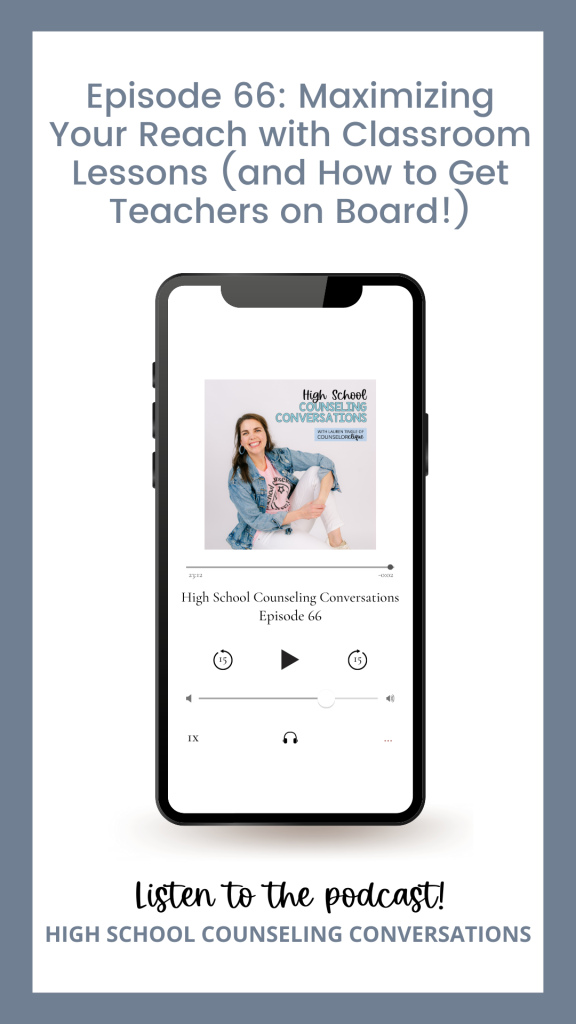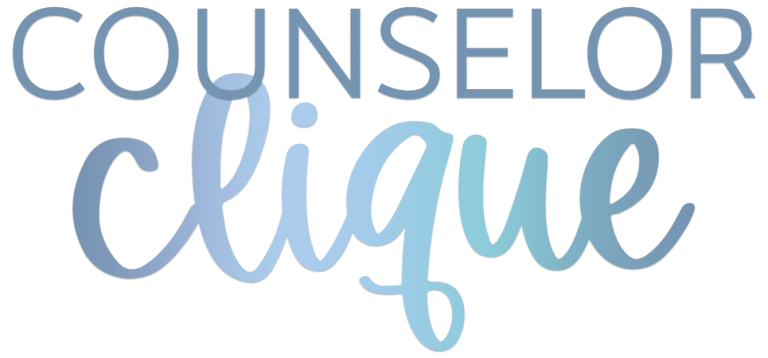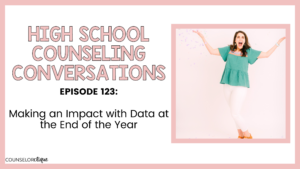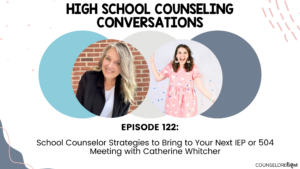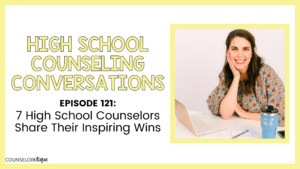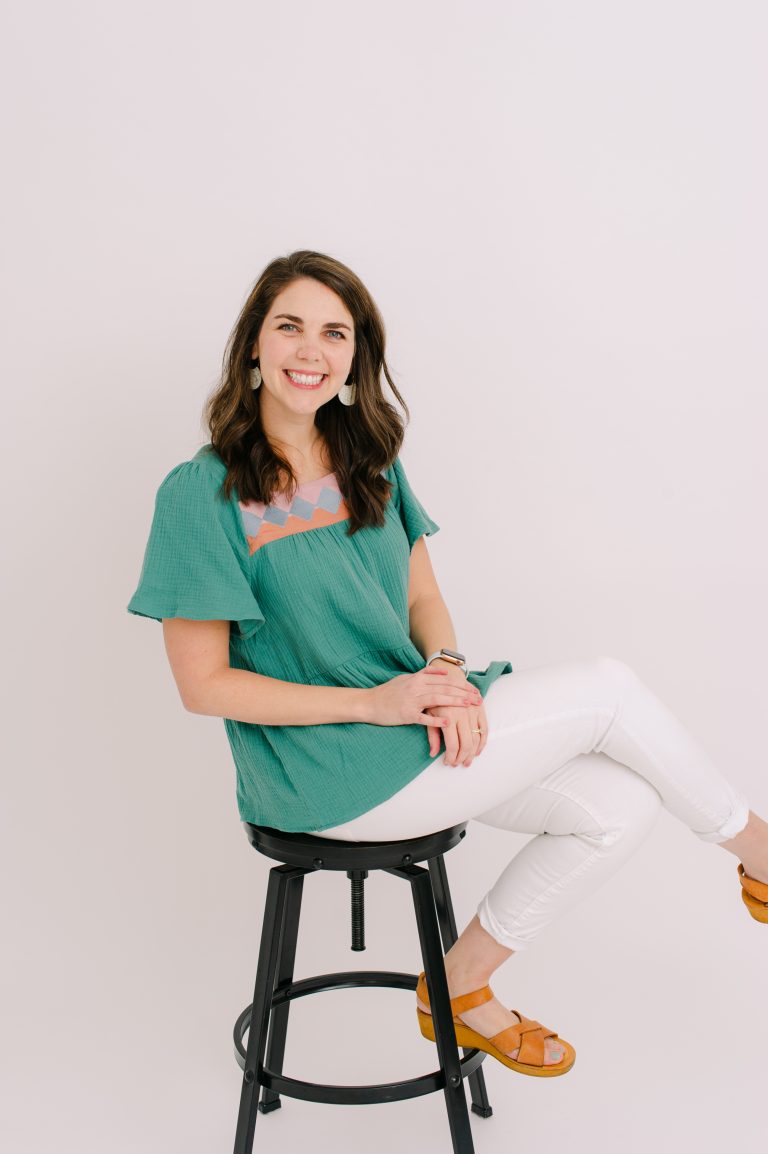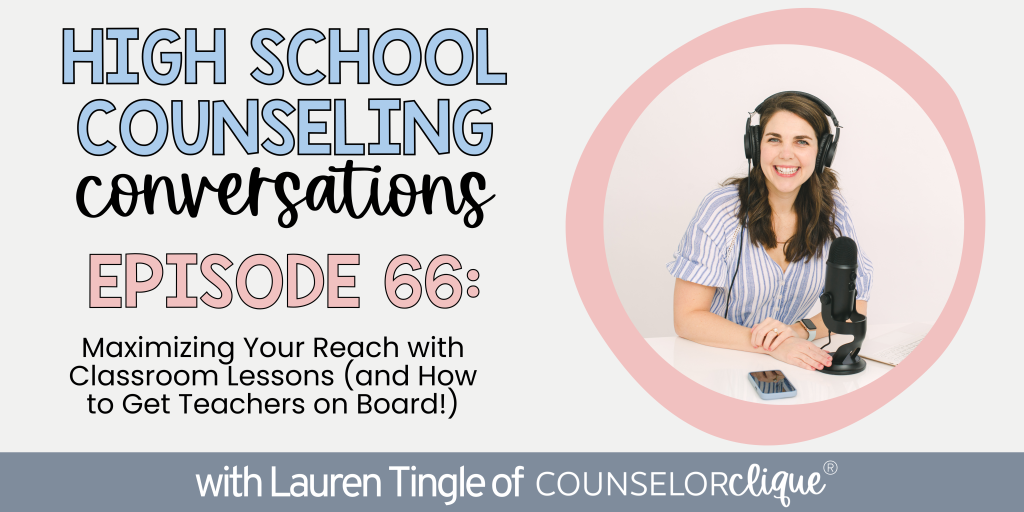
Here's What to Expect In This Episode:
There are so many things we do as school counselors to support and impact as many students as possible. One of the best ways that you can ensure you’re maximizing your reach as a high school counselor is through classroom lessons.
Maybe you’re already rocking classroom lessons, or maybe you don’t have that much experience in this area yet! Getting into the classrooms and doing lessons can be challenging for a variety of reasons. You might receive pushback from teachers or just feel like you have zero time in your schedule.
If you’re a counselor who hasn’t gone all in on classroom lessons yet, it’s not too late to change that! This episode will provide you with ideas to inspire you to get into the classroom and do some lessons, even if it feels scary. Whether it’s time or teacher buy-in that’s holding you back, I have suggestions for you. Just remember, supporting more students puts you on track to be a comprehensive school counseling program!
Topics Covered in This Episode:
- Specific teachers to connect with and approach about class lessons
- Sharing the benefits of your counseling class lessons with teachers if they are hesitant to give up their educational time
- Examples of topics to focus on in classroom lessons
- Utilizing your administrators to advocate for your classroom lessons
- How an intern can help you maximize your reach
- What to do if you feel like you don’t have the time for class lessons
- What a ‘flipped lesson’ is and how you can use it to reach more students in less time
- The importance of teaching topics that are actually relevant to your students
Resources Mentioned in This Episode:
- Sign up for your first Teacher Care Crate!
- Classroom Lessons from the Counselor Clique Store
- Classroom Lessons Blog Posts and Podcast Episodes
- Freebie: 10 Low Impact Ideas for Adding High Impact Career Services
- Podcast: Episode 64, CTE Teacher and High School Counselor Partnerships with Khristen Massic
- Podcast: Episode 62, Achieve Small Group Student Buy-In with These 4 Ideas
- Leave your review for High School Counseling Conversations on Apple Podcasts
Some resources may include affiliate links, which help to support this podcast at no additional cost to you.
Other Blog Posts You Might Like:
- Podcast: Episode 12, Why Knowing Student Names Can Make a Relational Impact on Your Counseling Classroom Lessons
- Podcast: Episode 13, How to Bring Social-Emotional Learning into High School Core Curriculum
- Podcast: Episode 14, 3 Ways to Build Your Confidence with High School Counseling Classroom Lessons
- Podcast: Episode 15, Why Building Relationships is the Hidden Key to Unlocking Classroom Lessons – an Interview with Rebecca Joyner of It’s Not Rocket Science®
Read the transcript for this episode:
Hi there! Welcome back to High School Counseling Conversations. I am your host Lauren Tingle of Counselor Clique. The last two weeks we have talked about careers. But this week we’re shifting gears a tiny bit, and we’re talking about classroom lessons.
And now I know that these two things can kind of overlap. But let me make sure I get a free resource in your hands that I think would be a good combination of the two of these. I want you to go check out my free PDF downloadable sheet called 10 low impact ideas for adding high impact career services to your high school counseling program. On this list, you’ll find 10 different ideas with clickable links to different resources blog posts, podcast episodes, that I know will be really helpful for you in adding career services to your high school counseling program.
So get that for free by going to counselorclique.com/careerimpact. I’ll link that in the show notes. In this week’s episode, we’re going to talk about doing classroom lessons in the high school setting, especially if you don’t have a lot of experience doing that already. If this is something foreign to you, and you’re not used to doing classroom lessons as part of your comprehensive high school counseling program, you’re going to want to listen to this episode.
Head back to episodes 12, 13, 14, 15 way back to the beginning, if you want to hear some more episodes on classroom lessons. Like how having those form relationships with students can unlock success in the classroom, how to bring SEL social emotional learning into classrooms, and how to build your confidence in classroom lessons, especially if you weren’t a teacher before you are a counselor. I know that was me. And I know that’s a lot of you.
High School Counseling Conversations is a podcast where we talk about exactly that a casual potpourri of school counseling topics intended to grow us as school counselors, but also give us space to enjoy each other’s company. I’m Lauren from Counselor Clique and I’m sharing my experiences and perspectives as a high school counselor. No topic is off limits. And I’m certain we’ll cover it all.
I’m your high school counseling hype girl here to help you energize your school counseling program and remind you of how much you love your job. Whether you’re just getting your feet wet as an intern, or you’re nearing retirement, you’ll feel like you’re just popping in to catch up with your school counseling bestie. Let’s go.
So let’s get into it. Let’s talk about how to make an impact in your classroom lessons, especially if you’re not doing it already. Here’s how to start. Let’s first start with the low hanging fruit. I’m going to give you a couple of different teachers who I would go after and try and get into their classrooms if being in classrooms is not a regular thing for you already.
Start with the teacher who maybe seems like they need something taken off their plate. That overwhelmed teacher who you always see in the hallways or running late into class, disheveled, you know, the one that’s always stressed about having their lesson plans ready or just feeling like they can’t reach all of their students.
I don’t want to say you’re giving them a break. But you might actually be giving them a break to come into the classroom, and just to do something different. They’re welcome to sit in the classroom and grade or sit in the classroom and participate with you. But it’s okay if they leave the classroom to go get some stuff done that they need to.
I think approaching this kind of teacher and saying, “Hey, I have to do this as part of my curriculum. It’s part of my standards to go into classrooms and deliver lessons to students. Can I help you out?” And if they take you up on it great. This is a great way to get in the classroom if it’s not the norm in your school.
If you have a teacher who you know is going to be out sick or they know ahead of time that they’re going to have some sort of leave or vacation where they’re not going to be there, make yourself available to them as a resource for their class. Now, I know you don’t want to be stepping into sub every time a teacher is sick. So I like to pre arrange this. I don’t want to be thrown into something and have it taken up space on my calendar when it’s not something that I planned on.
And I feel like a teacher would probably see eye to eye with you. But if I know that a teacher is going to be out or I hear a teacher mentioned this, like they’re so stressed out, they don’t have sub plans, and you’ve been itching to get into the classroom, this would be a great time to do it.
Reach out to that teacher, get it on your calendar and their calendar. And really everybody wins, especially if you’re trying to teach some classroom lessons. If you encounter a teacher who just seems like they’re open to partnering with others, maybe they are open to having guest speakers or they just seem like they’re willing to collaborate and try new things in their classroom. Go after that teacher asked to get some time in front of their students.
I know maybe this is not the right teacher if you are like grade level and you are with all ninth grade students all the time as a counselor and this teacher who is making themselves accessible is the senior teacher for gov and econ or something. You don’t really match up in terms of what you would be teaching and who your students are and what they’re teaching.
Use that teacher as leverage to get another counselor in your department to get their foot in the door. You know, especially if you are on a team of counselors. Don’t let all of this ride on you. Use everybody for their connections in the school and their relationships with other staff to make these classroom lessons start happening with your counseling program.
This one feels obvious to me, but if you have a friend in the school, who is a teacher, you know, you just get along with somebody and you need to call in a favor. I think this is a great person to tag and say, “Hey, can you do me a favor and let me get my foot in the door and teach a classroom lesson?”
Now, some of my best teacher friends were teachers of really high stakes courses. I’m talking US History, Biology, English I, the things in my state that had an end of course exam. Which that’s high stakes for a teacher. They don’t want to give up educational time, any teacher doesn’t want to give up educational time. But especially those ones who have a state test riding on their performance for the year, they need every bit of classroom time they can get.
And I understand that I would approach those teachers and say, “Hey, when you take your end, of course exam, I know you still have two weeks left to teach to the end of the semester, and you’re probably going to be wondering what you should be doing with that time. I would love to come in one day and teach XYZ lesson to your students because I know they would benefit because of this.”
So use it to their advantage, share the benefits with them that you’ll actually help them with some of their planning as they finish those end of course exams and they’re looking for things to do. You can also talk to elective teachers. Now, I don’t want to discount what elective teachers do. But a lot of times they’re not teaching to a state exam or something like that. So they have a little bit more flexibility, a little bit more creativity with their syllabus, and how they invite other people into that.
Someone you can reach out to is your freshman success teacher. Now you don’t have to be the freshman counselor to teach a lesson to freshmen success. I think there are a lot of opportunities here to teach anything that you want to from academics, and like reading a transcript, graduation requirements, scholarship requirements, to college and career to social emotional learning. You can really hit all of the counseling domains in a freshman success class, because it’s very wide open for that.
Another person to pinpoint in the school would be business teachers, CTE teachers, Kate teachers, you know, all the different names that they go by. Go back to Episode 64, from a couple of weeks ago, where I talked to Khristin Masstic and get a CTE teacher’s perspective. She had a lot of insights to share about how we as high school counselors can partner with CTE teachers right in the school.
These are really natural relationships that can happen in the school, we can benefit from each other. If we understand what each other do. I know Khristin and I talked a lot about just understanding each other’s roles. She said as a CTE teacher, a lot of times, she did not understand what the high school counselor in her school was doing. And so I think that is an advocacy piece that we always need to be aware of, especially as we’re trying to get into classrooms.
If a classroom teacher doesn’t even know that that is something that we do as high school counselors. Of course, they’re going to be skeptical when we’re asking to come into their classroom and teach a lesson. They are the experts in those classroom lessons, the classroom management, and really delivering content.
We have to figure out how to do that and get better at it and train ourselves how to do it. But we learn from teachers, we learn from the best in doing that. And I’m coming to you as someone who does not have a background in that. And so I feel like I have gathered, what works well, and what doesn’t work well from watching teachers who do it well as from watching teachers who don’t do it well.
In Episode 62, I talked about how when you’re putting small groups out into your school and trying to recruit students for those small groups. You really have to share with them the benefits of them joining one of your small groups, because it does matter if they’re bought in if they’re going to be good participants and good members of your small group. You really want to share what they’re going to get out of it.
And I would say the same is for teachers. When you are coming to them asking if you can borrow their instructional time to do classroom lessons. You know, it’s going to benefit the students and you know it’s going to better your program because you’re going to be serving students. But here’s the time when you really need to sell to teachers, that this is going to benefit them as well and ultimately their classroom because their students are going to be different because of what you do.
Now you always hear me saying that. I always say our goal as high school counselors is that students are different because of what we do. So make this an easy “yes” for teachers. Highlight the benefits to them, share with them how you anticipate students are going to be different in their classroom because of what you’re teaching them.
If it’s a social emotional learning lesson and you’re showing your students and teaching your students about how to be better communicators in relationship with each other, with their peers in the classroom setting, and with their friends outside of school, those teachers are really going to see that that’s going to overflow into their classroom community and into the teacher student relationship.
Make it easy for them to say, Yes, come in with a lesson plan, with mindsets and behavior,s with objectives that you want the students to learn. All of these things are included in the lessons that I have in my TPT store for classroom lessons. I’ll link all of my classroom lessons in the show notes so you can see hey, are there some topics that need to be covered in some of my classes or in my school setting? I put those all together for you. So that can be an easy yes for you to then present to teachers who will give you an easy yes and let you inside of their classroom.
If you have administrators on your team already in the school, I would say if all else fails with that counselor teacher relationship, use your administrators. Remind them that it’s part of your standards to be able to deliver classroom lessons as part of your comprehensive counseling services in a school.
This is an intervention that is going to reach a lot of students and then you’re going to get a better idea of who needs more intense services, you know, in smaller group or more individual settings, based on what you gather from being in the classroom. And hey, remind them it’s all data driven. Like you’re either going to have a pre or post test, you’re going to have some sort of exit ticket, you’re going to be checking for understanding to know if what you did in the classroom was effective for your students.
This episode is brought to you by Teacher Care Crate. Teacher Care Crate is your monthly reminder to practice self care while you rest and unwind. These monthly subscription boxes will show up on your doorstep in the form of art, bath and body items, on-trend accessories, and fun stationery items. Expect surprise and delight each month as your box is carefully curated for educators. Some of the themes of past boxes include garden party, glow from within, freshly squeezed, and even more creative themes. You will love the goodies you’ll find inside. Take a peek over on their Instagram, @ teachercarecrate to see what we’re working with here. To sign up for your first box, use my affiliate links by going to counselorclique.com/crate.
Okay, now that we addressed the low hanging fruit, all the teachers and the different types of teachers in your school that you could address, let’s get into some other areas that we could tap into so that we’re getting into classrooms, even if we haven’t been doing that already.
Do you have an intern? An intern could be a treasure trove of a resource to have in your back pocket as a high school counselor. I love having an intern so that I can multiply myself. I think if I do have to teach them and train them and build their confidence, that’s fine. They can come alongside me as I’m in the classroom.
But then I want them to go out and multiply me. I want to use them along the same lines as what I’m doing, but have them go into a neighboring classroom. And so that might look like they’re with me watching me deliver a lesson first. Then they are co teaching it with me. And then maybe I’m watching them and giving them feedback. And then they’re going out and doing it on their own.
Can you imagine how many more classrooms and how many more students you’re going to reach if you have more than one of you? If you have a newer counselor in your department who maybe you are deciding you should take under your wing, or you have somebody in your department who doesn’t love doing classroom lessons, this will be a great time to take them in the same way that you would take an intern and say, “Hey, let’s do this together.”
I always had a lot of fun working with the people in my department and I absolutely love them. So I would be looking for any excuse to do something alongside another counselor. Even somebody who liked doing classroom lessons. If we got to do a classroom lesson together, I was really excited and really energized by that.
Now I know if you’re not doing classroom lessons already, one of the barriers maybe you have run into, and maybe one of the reasons you’re not doing it, is because you feel like you don’t have time. I would say, like I always say, put it on your calendar. Often the hardest part is making the time and space to make it happen.
Head back to Episode 44- ‘Owning Your Time Management By Using Your Calendar’ and really get an idea of how powerful your calendar can be for the impact of your services on students. You are allowed to put time on your calendar to plan for things so go ahead and do that.
The logistics in a high school setting are probably the most intimidating and scary part of doing classroom lessons especially if you’re at a large school, it does require a lot of planning and communication. You’re reaching out to teachers to get you some space in the classroom setting. Then you’re emailing with them to either pick a time, you’re going back and forth, you’re working with your busy schedule.
It can be a nightmare getting all of that on the calendar and making it happen. And then heaven forbid, someone is sick like you, and you have to reschedule something. So I know it can feel really daunting, but it’s definitely worth it to get it on your calendar.
Think of what kind of goals you want in terms of your classroom lessons for the year. Is it one time a year? Is it to see students once each semester? You have to decide what kind of timeframe you’re looking at, and then how you’re going to achieve that between all of your counselors, and then all of the classes in your school and who you’re trying to reach.
Along the lines of kind of multiplying yourself if you are a solo counselor, or you just are really feeling spread thin on that time, record a video and share that out with your teachers. Now, I know not all teachers are going to do this with integrity. You hope that they’re going to play the video, read anything that you want to pass along, handout, anything that you want to hand out. But I know it doesn’t always happen that way.
In a perfect world, it would. So you could record a video, have them show it and kind of use this as a flipped lesson, if you’ve ever heard of that. In a flipped lesson, a video is shown to students ahead of time or maybe they do it for homework before. And then you can come in and follow up.
And so there’s less time that you are spending in the classroom, but they’re still seeing your face, hearing your voice, getting some sort of lesson, or maybe an introduction to a lesson. And then you’re coming through and really nailing that lesson down. You’re reinforcing some skills that maybe they learned in the video, you’re coming into practice, facilitate, show them how it’s done. I think that can be a really good use of your time.
And then lastly, if you are looking for ideas to get into the classroom, and maybe some inspiration to help you do this, if you aren’t doing it already. Teach topics that are actually relevant to your students. So this means you need to figure out what their needs are and what their wants are through a needs assessment. This makes deciding what you’re going to teach in the classroom a lot more direct.
You could remind students when you get there or encourage them that hey, you wanted me to teach this, you ask for this off of a list of ideas. And I hope you’re excited about it because I’m here, because this is what you asked for.
So do a needs assessment either at the beginning of the year or midway through the year. Or if we are where you are right here in the middle of the year, and you’re wanting to get in classrooms, do a really quick short needs assessment to just inform what you want to go into the classroom and talk about.
If you’re trying to do something a little less formal, but you still want to be informed about the topics, reach out to those teachers that we talked about in the beginning of the episode and ask them what topics they’re seeing in their classroom that need to be addressed.
You would be surprised at how many teachers will be able to come up with things right off the top of their head. From peer relationships, to hygiene issues, to scholarship needs. They hear it all as teachers, they get to be our eyes and ears and they can report back and kind of have some consultation and collaboration with you before you ever go into the classroom.
Once you have some topics either beginning of the year or midway through the year, that’ll give you some time to help prepare you for all the lessons that you want to do throughout the year. You know, maybe it is starting very small, and it’s just one a semester. Because to do one a semester and reach everyone in the whole school can take a lot of manpower, I get that.
Hey, I hope this episode provided you with some ideas to inspire you to get into the classroom and do some classroom lessons, even if it feels really daunting, and you’ve never done it before, or you haven’t made it a regular routine in your school counseling department yet. I know that when you start doing classroom lessons, this is going to fill a gap and a need in your school counseling program that’s going to put you on track to be a comprehensive school counseling program, instead of just a reactive program.
You’re going to be proactive, you’re going to be serving your students, and you’re going to be reaching so many students when you do classroom lessons. So remember to grab that PDF download for Career Services For Your High School Counseling Program. That was 10 low impact ideas for adding high impact career services to your high school counseling program. You can get that by going to counselorclique.com/careerimpact and it will also be in the show notes.
This will be a great way to combine Career Services and classroom lessons and to tie it up with a pretty bow and make it all happen in your school this year before the year is over. So go ahead and grab that and then I’ll see you next week for a special guest episode.
Thanks for listening to today’s episode. of High School Counseling Conversations. All the links I talked about today can be found in the show notes and also at counselorclique.com/podcast. Be sure to hit follow wherever you listen to your podcast so that you never miss a new episode. Connect with me over on Instagram. Feel free to send me a DM @counselorclique. That’s C L I Q U E. I’ll see you next week.
Connect with Lauren:
Cheers + Happy Listening!
Like what you’re hearing? Follow and leave a review on Apple Podcasts. It helps other high school counseling friends find it!
Can’t contain your excitement? Share the pod! Tell a friend! Your word-of-mouth referrals mean the world to me!
